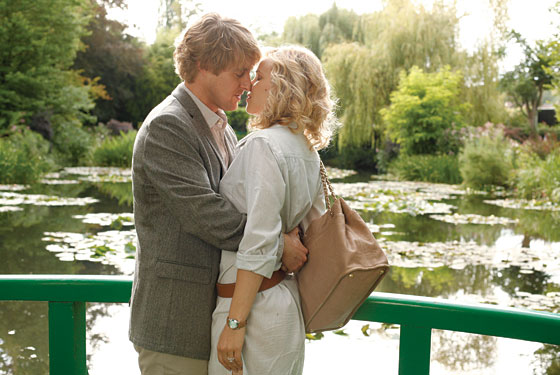
Given that Woody Allen’s imaginative universe has long been a closed ecosystem (no contemporary culture can penetrate a defensive shell hardened by such determined phobias), it’s a miracle he can still turn out a movie as disarming as Midnight in Paris. This supernatural comedy isn’t just Allen’s best film in more than a decade; it’s the only one that manages to rise above its tidy parable structure and be easy, graceful, and glancingly funny, as if buoyed by its befuddled hero’s enchantment.
That hero, Gil, is played by Owen Wilson, and he’s finer than any male actor who has ever stood in for Allen—finer than Allen often has been, too. Gil is a successful Hollywood screenwriter who considers himself a hack and wants to write novels, preferably in Paris, where he’s on holiday with his go-go fiancée, Inez (Rachel McAdams). And if he had his druthers, he’d be doing it in Paris in the twenties, alongside Scott and Zelda, Hemingway, Gertrude Stein, Cole Porter, Picasso, Cocteau, and all those other giants living large yet somehow creating enduring works of art.
Yammering about Paris in what Gil considers its golden age while Inez scoffs, Wilson is wide-eyed without being fatuous, and lines that could sound like lazily reflexive, Yiddish-inflected gripes become philosophical and urgent. His stammer is never shtick. It wasn’t until Wilson’s apparent suicide attempt that some of us finally identified the vein of wistfulness under the stoner cool, the longing for definition behind the spaciness. As Gil, this straw-haired Texan makes Allen’s rhythms—along with Allen’s essential disappointment at living in the here and now—his own.
The mechanism by which Gil travels back (via vintage automobile at midnight) to his beloved era goes happily unexplained, thus eliminating the sci-fi wheels and pulleys that tend to suck up so much screen time in time-travel movies. Allen just breezes past all that, the way he did in his great The Purple Rose of Cairo and, before that, in his 1977 short story “The Kugelmass Episode.” Actually, the twenties scenes recall another Allen story, “A Twenties Memory,” which is full of passages as blissful as this: “Hemingway had just finished two short stories about prize fighting, and while Gertrude Stein and I both thought they were decent, we agreed they still needed much work … We laughed a lot and had fun and then we put on some boxing gloves and he broke my nose.”
Allen doesn’t do much with Scott (Tom Hiddleston) and Zelda (Alison Pill)—perhaps he’s too in awe of them. (They do loom large.) But his Hemingway, played with forthright manly-manliness by Corey Stoll, is riotously funny, and as Gertrude Stein, Kathy Bates proves that one earnest straight person can be more treasurable than a thousand clowns. Allen holds his trump card until the halfway mark, when a celestial vision appears, as if sprung from the sub-sub-basement of a turgid Christopher Nolan picture: Marion Cotillard as Adriana, mistress to the star-artists of the twenties, and so unfathomably gorgeous that she doesn’t seem to be of this or any era. Cotillard is a true showstopper: She creates her own cinematic present.
Allen has become such a fluid craftsman that the occasional off notes don’t matter too much. Having to work so fast (and cheap) has freed him from what might have been a hell of Kubrickian fussiness. Write it, shoot it, edit it, move on to the next one, and don’t stop, because if you do, you may not ever be able to start again.
Like many of Woody Allen’s films, Midnight in Paris ends with a moral, this time vaguely self-deprecating, with an anti-nostalgia kick: Everyone wishes that he or she lived in another era, even people in that other era. It hurts because we know from Allen’s frames of reference that he’s often lost in pipe dreams of the past. But it’s possible there’s another kind of nostalgia at work in Midnight in Paris: not just longing for the Parisian twenties but for the days in which Allen regularly turned out freewheeling, pitch-perfect parodies like this. The movie is so good it’s takes you back to those days, which were the days, my friend.
Midnight in Paris
Directed by
Woody Allen.
Sony Pictures Classics. PG-13.
E-mail: [email protected].
